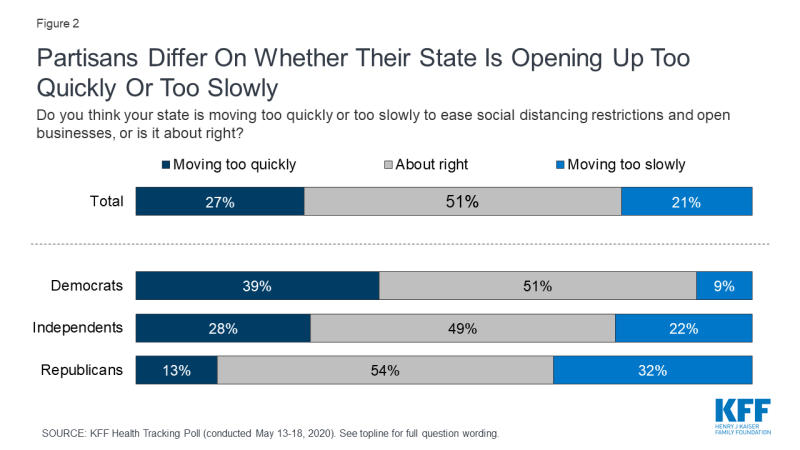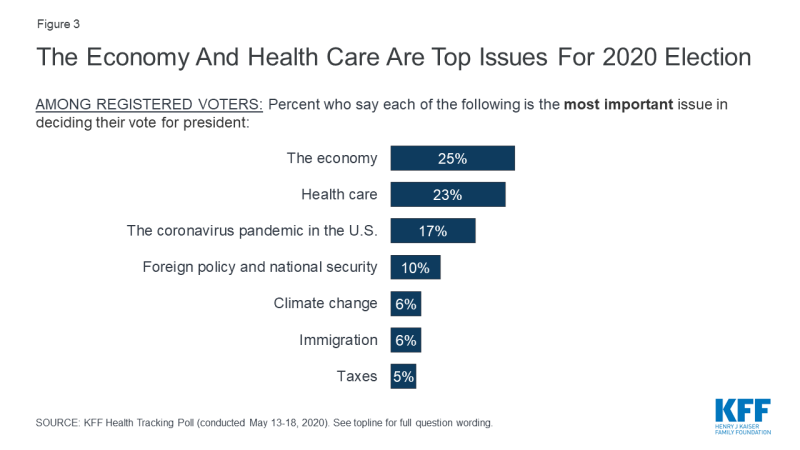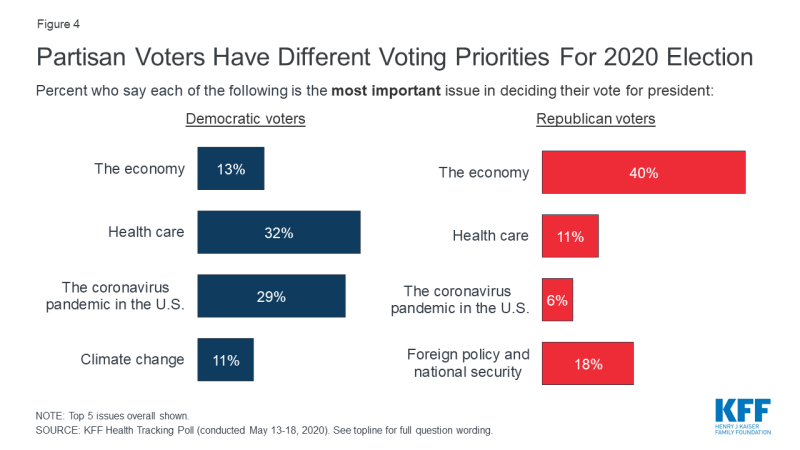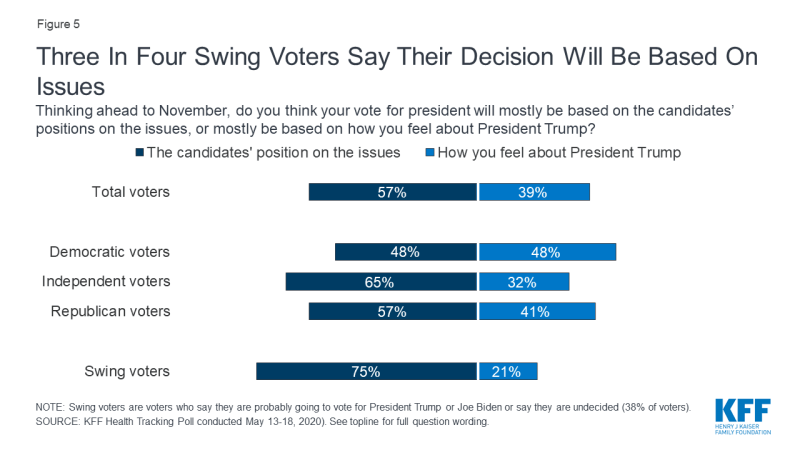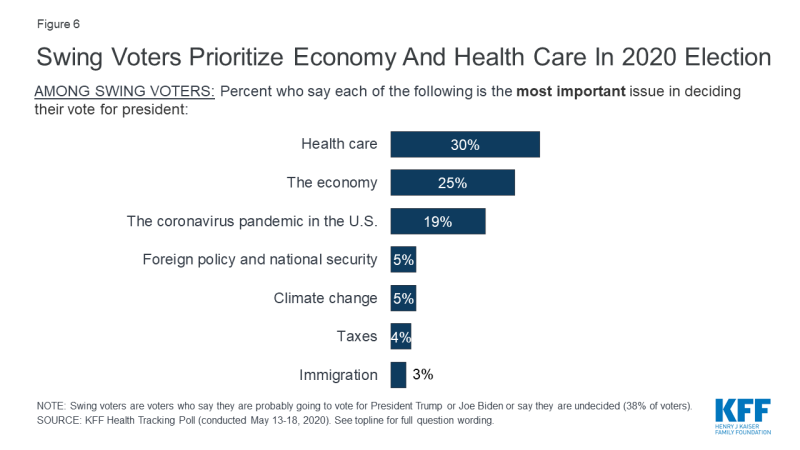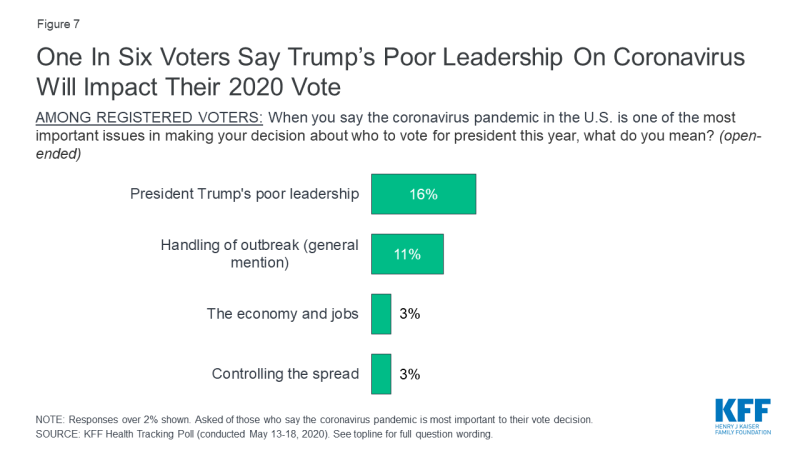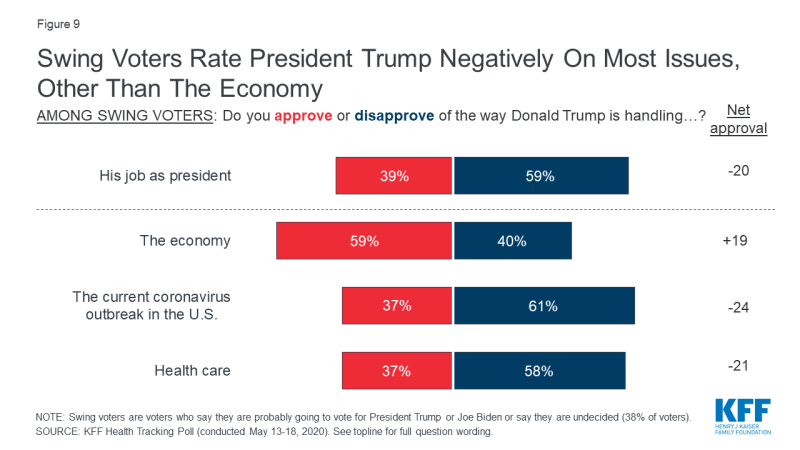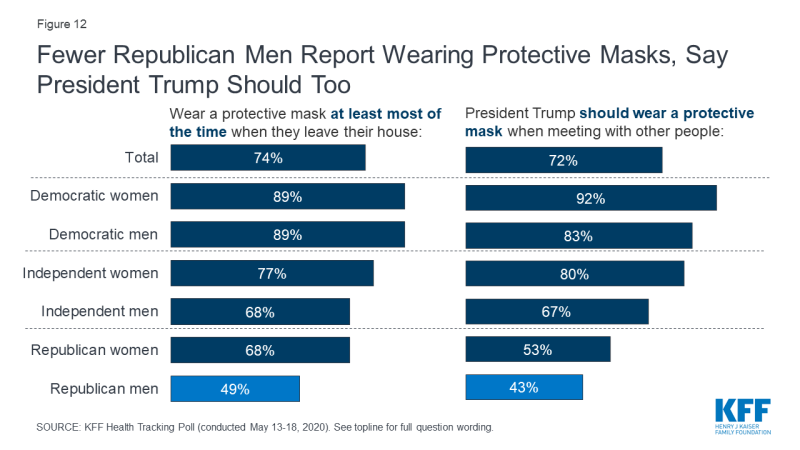KFF Health Tracking Poll - May 2020
Key Findings:
- Most Americans expect the coronavirus to upend summer vacation plans with few saying it is likely they will be staying in a hotel (32%), going on an airplane (23%), or going to a concert or sporting event (19%) in the next 3 months. Yet, majorities including most Republicans and independents, expect to be getting back to some usual activities in the coming months such as going to the doctor, going to a barber or salon, attending larger gatherings, or eating in a restaurant. Most Democrats say it is unlikely they will be doing any of these activities except for going to a doctor or health care provider.
- In the midst of the coronavirus outbreak, the economy and health care rank solidly as the top two issues in the 2020 presidential election, with all other issues trailing far behind for voters. Yet, the issue most important to voters is largely driven by party identification. Four in ten Republican voters say the economy is their top voting issue while one-third of Democratic voters (32%) choose health care as the most important issue in their voting decision. The coronavirus outbreak itself ranks as among the top issues among Democratic voters (29%), but ranks as the third issue among total voters (17 percent) and swing voters (19 percent).
- President Trump receives negative ratings on his job performance and handling of coronavirus and health care, but the public does not seem to be punishing him for the decline in the nation’s economy as a result of the coronavirus outbreak. A majority of the public (57%) and the crucial block of undecided voters known as “swing voters” (59%) continue to approve of President Trump’s handling of the nation’s economy. President Trump remains largely popular among Republicans with majorities approve of his handling of all national issues.
- Democrats are almost twice as likely as Republicans (70% v. 37%) to say they wear a mask “every time” they leave their house and while most people (72%) think President Trump should wear a mask when meeting with other people, only about half of Republicans (48%) agree. The partisan difference in opinion and behavior regarding masks is largely driven by Republican men. About half of Republican men report wearing a protective mask at least most of the time when leaving their house to go someplace where they may come into contact with others (49%) and smaller shares say President Trump should wear a mask when meeting with other people (43%).
As Many States Are Re-Opening, Most U.S. Residents Don’t Expect To Get Back To Normal Soon
The coronavirus outbreak has had widespread effects across the U.S. bringing most Americans’ lives to a halt for the past couple months. But as states begin to re-open, Democrats and Republicans hold very different views of what the future holds. Most Republicans say the worst of the coronavirus is behind us or that the virus was never a threat, and they are likely to go back to usual activities in the coming months. Democrats, and to some extent independents, are more wary of the future and don’t think it is likely that their lives will be back to normal in the coming months.
Overall, half of U.S. adults still say that “the worst is yet to come” when it comes to the coronavirus outbreak in the U.S., which is considerably larger than the share (28%) who say “the worst is behind us.” The share who say “the worst is yet to come” remains relatively unchanged since last month’s KFF Health Tracking Poll, and the partisan divide remains. This month finds two-thirds of Republicans saying either “the worst is behind us” (45%) or that they don’t think the coronavirus is or was a major problem in the U.S. (20%).On the other hand, most Democrats (70%) and half of independents say “the worst is yet to come.”
Larger Shares of Republicans Report Going Back to Usual Activities
Most think that it is at least somewhat likely that they will resume some usual activities within the next three months, such as going to a dental or medical appointment in person (82%), attending gatherings with more than 10 people (58%), going to a barber or salon (56%), and eating in person at a restaurant (53%). Yet, while next week marks the official beginning to summer with observance of Memorial Day, few think it is “likely” they will be doing many typical summer activities such as staying at a hotel or vacation rental (32%), flying in an airplane (23%), or attending a concert or sporting event (19%) in the coming months.
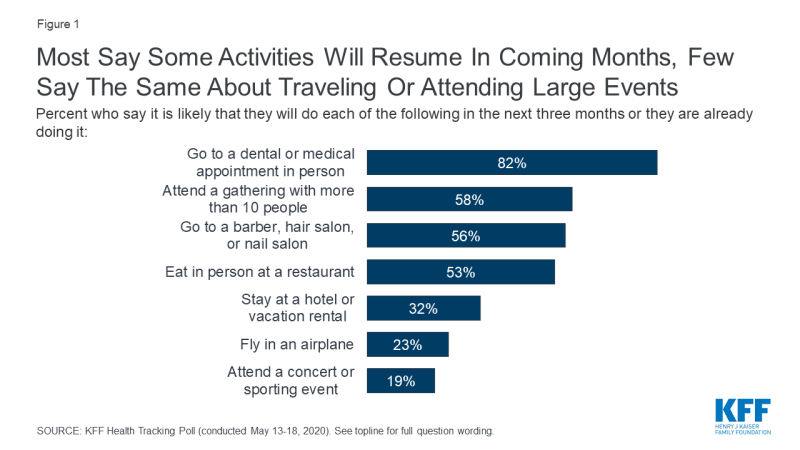
Figure 1: Most Say Some Activities Will Resume In Coming Months, Few Say The Same About Traveling Or Attending Large Events
Majorities of Democrats (79%), independents (83%), and Republicans (91%) say it is likely they will go to a doctor, dentist, or other medical appointment in person in the next three months; but less than half of Democrats say the same about going to a barber or salon (43%), attending larger gatherings (43%), or eating in person at a restaurant (39%). Majorities of Republicans and independents say they are either already doing these activities or it is likely they will do them in the next three months.
Few – across party identification- say it is likely they will stay at a hotel or vacation rental, fly in an airplane, or attend a concert or sporting event in the coming months.
| Table 1: Partisans Disagree On How Likely It Is They Will Be Back To Usual Activities | |||
| Percent who say it is likely they will do the following in the next three months or are already doing the following: | Party Identification | ||
| Democrats | Independents | Republicans | |
| Go to a doctor, dentist, or other medical appointment in person | 79% | 83% | 91% |
| Go to a barber, hair salon, or nail salon | 43 | 55 | 74 |
| Attend a gathering of family or friends with more than 10 people | 43 | 58 | 73 |
| Eat in person at a restaurant | 39 | 52 | 75 |
| Stay at a hotel or vacation rental | 24 | 31 | 43 |
| Fly in an airplane | 21 | 25 | 25 |
| Attend a concert or sporting event | 8 | 20 | 31 |
Is Your State Opening Too Soon? Depends On Where You Live
About half of adults – across party identification – say they think their state is moving at about the right speed in easing social distancing restrictions and opening businesses while one in four (27%) say their state is moving “too quickly” and one in five (21%) say their state is opening “too slowly.”
More than three times as many Republicans (32%) as Democrats (9%) say their state is opening “too slowly,” and one-fifth (22%) of independent say the same. Four in ten Democrats (39%) say their state is opening “too quickly” compared to 28% of independents and 13% of Republicans. About half, across party lines, say their state is doing things “about right.”
With all U.S. states taking some steps to re-open their economies, some states – most notably those with Republican governors like Texas and Arizona – have pushed to re-open their states sooner than many public health officials have advised. About four in ten (37%) of those living in states with a Republican governor say their state is moving “too quickly” compared to one in five of those living in states with a Democratic governor.
There are strong party divides with partisans more likely to support their state’s actions if their governor shares their party identification. Nearly two-thirds (64%) of Republicans living in a state with a Republican governor saying their state is doing things “about right,” while most Democrats (62%) and a slight majority of independents (51%) living in states with a Democratic governor saying their state is doing things at about the right speed.
| Table 2: Partisans Living In Republican-Led States Have Different Views On Whether Their State Is Re-Opening Too Quickly Or Too Slowly | ||||
| Do you think your state is moving too quickly or too slowly to ease social distancing restrictions and open businesses, or is it about right? | Living in a state with a Republican Governor | |||
| Total | Democrats | Independents | Republicans | |
| Too quickly | 37% | 56% | 40% | 16% |
| Too slowly | 15 | 9 | 15 | 20 |
| About right | 47 | 34 | 44 | 64 |
| Do you think your state is moving too quickly or too slowly to ease social distancing restrictions and open businesses, or is it about right? | Living in a state with a Democratic Governor | |||
| Total | Democrats | Independents | Republicans | |
| Too quickly | 20% | 27% | 19% | 11% |
| Too slowly | 26 | 9 | 28 | 45 |
| About right | 52 | 62 | 51 | 43 |
Amidst Outbreak, Republican Voters Say Economy Is Top 2020 Issue While Health Care And Coronavirus Weighs Heavily On Democratic Voters
With less than six months before the 2020 presidential election, partisan voters are prioritizing different issues with the economy and health care rising to the top. Overall, both the economy (25%) and health care (23%) are the top issues for voters when deciding their vote for president in November. These two issues outrank all other issues including the coronavirus outbreak (17%), foreign policy and national security (10%), climate change (6%), immigration (6%), and taxes (5%).
Throughout the 2020 Democratic presidential primary, Democratic voters said health care was their most important issue. In fact, in all of the 17 states in which KFF has analyzed AP VoteCast survey data of primary voters and caucus-goers, health care was either the top issue (15 states), or among the top issues (2 states). Health care remains a top issue for Democratic voters with one-third (32%) choosing health care as the most important issue to their vote decision, followed closely by the coronavirus pandemic in the U.S. (29%). Fewer Democratic voters (13%) say the economy is the most important issue. Republican voters, on the other hand, are prioritizing the economy over all other issues with four in ten saying it is “the most important issue” followed by foreign policy and national security (18%). Fewer Republican voters say either health care (11%) or coronavirus (6%) is the most important issue to their vote. Independents are split with similar shares prioritizing health care (25%) and the economy (25%).
Swing Voters Say Issues, Not Trump, Will Drive Their 2020 Decision
With former Vice President Joe Biden now the presumptive nominee for the Democratic candidate for president, the latest KFF Health Tracking Poll examines the views of voters who have not yet made up their minds about who to vote for.
Defining Swing Voters
A similar share of voters say they are either “definitely going to vote for President Trump” (30%) as say they are “definitely going to vote for Joe Biden” (28%), while nearly four in ten voters either say they are undecided in their 2020 vote choice (11%) or are probably going to vote for President Trump (11%) or Democratic nominee Joe Biden (15%) but have not made up their minds yet.
Swing voters are more likely than voters, overall, as well as voters across party identification to say their vote for president will “mostly be based on the candidates’ position on the issues” (75%) rather than based on “how they feel about President Trump” (21%).
Swing voters’ priorities in their 2020 vote choice are similar to the rankings among all voters, with three in ten swing voters saying health care is their top issue and one-fourth choosing the economy as their top issue. About one in five (19%) say the coronavirus pandemic in the U.S. is the most important issue in deciding their vote.
Is Trump’s Handling of Coronavirus Impacting Voters’ 2020 Decision?
Nearly one in five voters overall (17%) and three in ten Democratic voters (28%) say the coronavirus pandemic in the U.S. is going to be “the most important issue” when deciding their vote for president. When voters who said coronavirus was going to be very important to their vote are asked to say in their own words what about the outbreak is going to impact their vote, larger shares offer negative responses about President Trump’s handling of the virus than any other response. About one-third of voters who say coronavirus is important to their vote (16% of all voters) offer responses related to President Trump’s poor leadership, four times as many who offer any other response including the impact on the economy and jobs (3% of all voters). An additional one in ten (11%) mention general responses related to the handling of the outbreak.
This is consistent with how the public rate the job President Trump is doing with the current coronavirus outbreak in the U.S. President Trump now receives negative ratings for his handling of the coronavirus outbreak with a slightly smaller share approving (46%) than disapproving (52%) of his handling of this issue (-6 percentage points net approval). This marks a decline in the public’s evaluation of his handling of the coronavirus outbreak from six weeks ago when 50% of the public approved of his response and he had a net positive rating (+3 percentage points net approval).
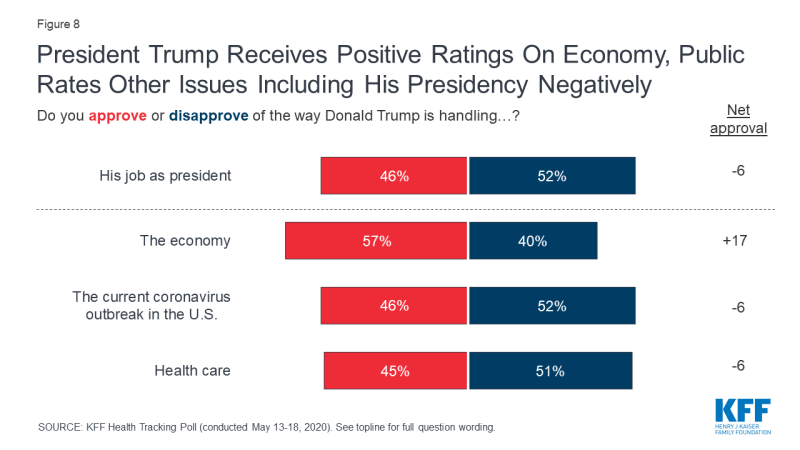
Figure 8: President Trump Receives Positive Ratings On Economy, Public Rates Other Issues Including His Presidency Negatively
Even among the largest job loss in recent history and economists’ warning about long-term unemployment, President Trump continues to receive positive ratings in his handling of the economy (+17 percentage points net approval).
Partisans continue to be strongly divided in their assessment of President Trump’s job performance, with at least eight in ten Republicans approving of the way he is handling the economy (91%), his job as president (89%), the current coronavirus outbreak in the U.S. (87%), and health care (84%). Democrats, on the other hand, largely disapprove of his job as president (87%), as well as the way he is handling health care (86%), the current coronavirus outbreak (84%), and the economy (71%). Independents are divided in their assessments of his job performance overall but give him negative assessments on his job approval overall (-10 percentage point net approval), as well as his handling of health care (-10 percentage point net approval) and the current coronavirus outbreak (-6 percentage point net approval), but positive ratings on his handling of the economy (+20 percentage point net approval).
| Table 3: President Trump Job Approval By Party Identification | ||||
| Do you approve or disapprove of the way Donald Trump is handling…? | Party ID | |||
| Democrats | Independents | Republicans | ||
| His job as president | Approve | 12% | 44% | 89% |
| Disapprove | 87 | 54 | 10 | |
| The economy | Approve | 25 | 59 | 91 |
| Disapprove | 71 | 39 | 9 | |
| Health care | Approve | 12 | 41 | 84 |
| Disapprove | 86 | 51 | 12 | |
| The current coronavirus outbreak in the U.S. | Approve | 15 | 46 | 87 |
| Disapprove | 84 | 52 | 12 | |
Swing voters are also negative in their assessments of President Trump’s presidency and his handling of most national issues. Swing voters (who comprise 38% of all voters) largely disapprove (59%) of the way President Trump is handling his presidency and are also negative in Trump’s handling of both the coronavirus outbreak (-24 percentage point net approval) and health care (-21 percentage point net approval). Swing voters, like the overall public, remain positive in their assessments of his handling of the economy (+19 percentage point net approval).
Is The Use Of Masks Partisan?
Three-fourths (74%) of adults say they wear a protective mask either “every time” or “most of the time” when they leave their house and might be in contact with people, which is consistent with the Centers for Disease Control and Prevention (CDC) recommendations that people wear a mask anytime they may be unable to maintain safe social distancing. But there are strong partisan differences with Democrats almost twice as likely as Republicans (70% v. 37%) to say they wear a mask “every time” they leave their house. Majorities across partisans say they wear a mask at least most of the time.
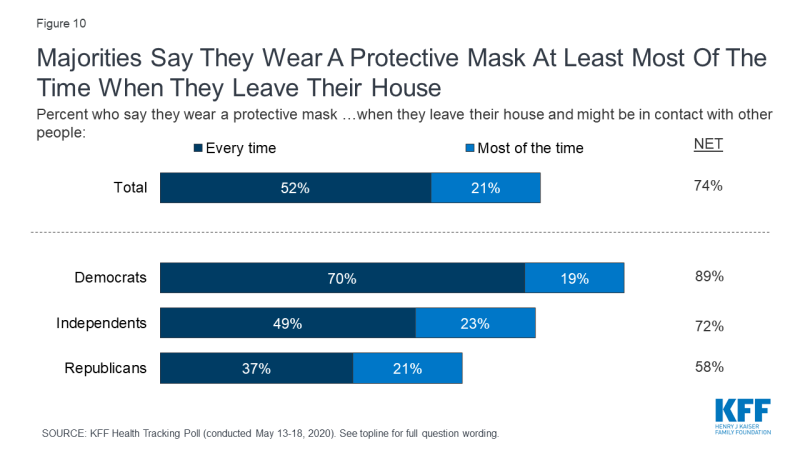
Figure 10: Majorities Say They Wear A Protective Mask At Least Most Of The Time When They Leave Their House
There have been recent news reports about people protesting the requirement of wearing masks in order to limit contact and reduce the spread of coronavirus including some recent criticism of President Trump for not wearing a mask when making public appearances. Most people (72%) think President Trump should wear a mask when meeting with other people, but only about half of Republicans (48%) agree.
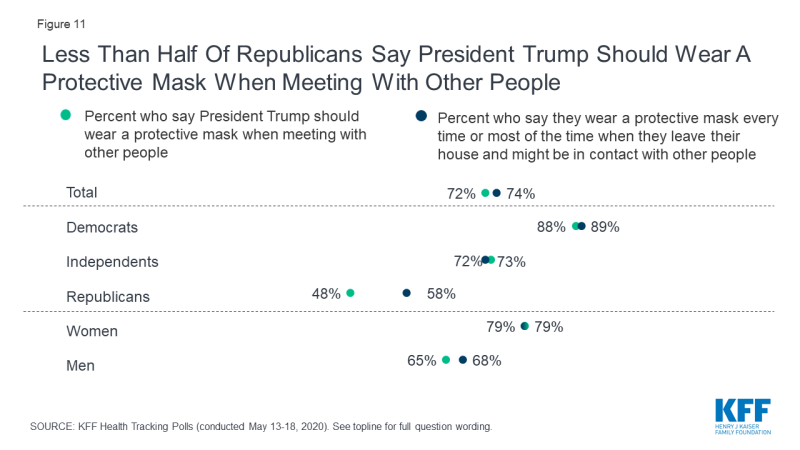
Figure 11: Less Than Half Of Republicans Say President Trump Should Wear A Protective Mask When Meeting With Other People
The partisan difference in opinion and behavior regarding masks is largely driven by Republican men. Republican men are both less likely to report wearing a protective mask when leaving their house to go someplace where they may come into contact with others and smaller shares say President Trump should wear a mask when meeting with other people. About half (49%) of Republican men say they wear a mask at least most of the time, compared to 68% of Republican women and more than two-thirds of independent men (68%) and a large majority of Democratic men (89%). Slightly more than four in ten Republican men (43%) say President Trump should wear a mask compared to 53% of Republican women, and large majorities of both independent men (67%) and Democratic men (83%).

